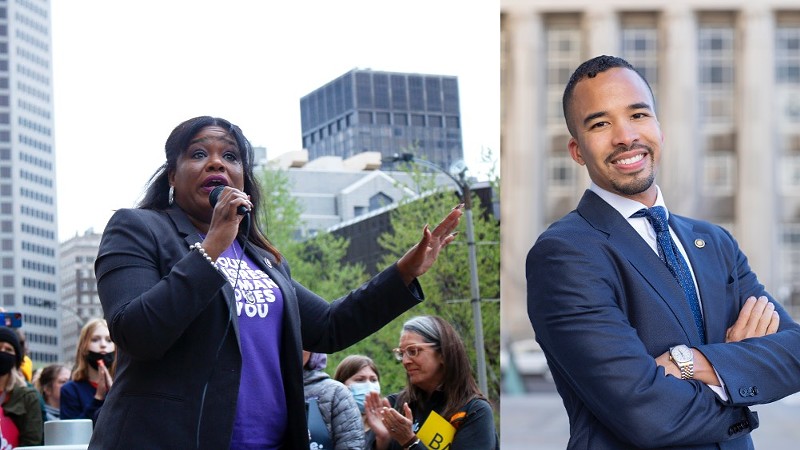
Two years ago, U.S. Representative Cori Bush (D-St. Louis) surprised many when she toppled 10-term incumbent Congressman William Lacy Clay Jr. and captured nearly 49 percent of the vote in the August 2020 primary for Missouri's First Congressional District.
Before she won, Bush always seemed like the most unlikely candidate. An activist who moved into political circles after the Ferguson unrest, Bush rose from humble origins as a nurse, pastor and single mother. Clay, her Democratic primary rival, came from a dynastic family led by civil rights icon William Lacy Clay Sr., who represented Missouri's First district for three decades before his son took his place. Bush was the opposite of a political insider. She lacked the institutional support of bigwig donors and chanted "Defund the police!" to the dismay of more centrist Democrats.
In her 2016 run for U.S. Senate, Bush lost the primary to Democratic golden boy Jason Kander, Missouri's then-secretary of state, who subsequently lost to Roy Blunt.
But Bush is no underdog now.
She's out-raised her best-funded opponent by nearly $1.4 million. She's received endorsements from national organizations and political figures, including Senator Bernie Sanders, and is regarded as one of the most fervent progressives in Congress. (Bush was not available for an interview for this story.)
This election, Bush's primary opponent is another moderate Democrat from a dynastic political family.
State Senator Steve Roberts (D-St. Louis) is a fourth-generation St. Louisan, the son of prominent St. Louis doctor Eva Frazer and former St. Louis alderman and businessman Steve Roberts Sr. Frazer helped bring a free clinic to north St. Louis in Saint Louis University's Victor Roberts Building (named after Roberts' grandfather) to provide health care to the uninsured. The senior Roberts, along with his brother Michael, once helmed a $1 billion empire of hotels, real estate, TV stations and more.
The younger Roberts has been embroiled in controversy most of his political career. In 2015, he allegedly groped Saint Louis University law student Amy Harms at a bar. In 2016, as a newly elected state representative, fellow freshman Cora Faith Walker alleged Roberts had raped her and asked that he not be seated. Roberts maintained that their interaction was consensual. Prosecutors declined to press charges, and Roberts was seated. He then sued Walker for defamation, and she countersued.
Ultimately, Walker and Roberts settled in 2019, and Walker died not long before Roberts announced his run for Congress. Since then, Harms has spoken publicly about her incident with Roberts, including that his insurance paid her a $100,000 settlement.
Now, investigations into Roberts' campaign finances reveal he is receiving support from Republican and Clay-backed super PACs, with sloppy paperwork obfuscating how much the PACs have raised and from whom. An article published by the Intercept last Thursday found Roberts' father held multiple titles at SCD Investments LLC, the largest donor to an anti-Bush PAC.
Yet Roberts has trudged through these scandals in pursuit of a congressional position that increasingly feels like a long shot.
Roberts was elected as state senator for Missouri's Fifth District a year ago after serving two terms as a state representative for the 77th House District. He says he fully intended to serve two terms as a senator but changed his mind when he realized Bush's actions as congresswoman caused "direct harm to the growth and development of the city of St. Louis."
"I had great hopes for Cori Bush when she was elected, but she has aligned herself with the Bernie Sanders agenda and that is not only creating further division in the Democratic Party, but that agenda does not align with the wishes of the voters in the 1st Congressional District," Robertswrote in an email to the RFT.
Throughout his campaign, Roberts has directed criticism at Bush's voting record, which hasn't always stayed in line with her party.
Bush voted against President Joe Biden's bipartisan infrastructure plan when there wasn't enough support for a separate Build Back Better proposal to address childcare and climate change. She told the St. Louis Post-Dispatch, "I didn't come to Congress [to] allow our priorities to be put on a shelf."
Bush also opposed the Domestic Terrorism Prevention Act proposed after 10 people were killed at a shooting in Buffalo, New York. The bill lacked protections for people of color, Bush said in a May interview, but it later passed with a near party-line vote after Bush revised the bill's language and won the support of fellow progressives.
These "no" votes, and others like them, led Roberts to say Bush has "abandoned the Democratic Party." He also doesn't agree with some of Bush's most progressive pushes such as defunding the police, saying his political ideology is more in line with Biden than Sanders.
"No one knows what will happen in the midterm elections, there is a very real possibility that Democrats could lose their very narrow majority in both the House and Senate," Roberts says via email. "It is imperative that we have Democratic leaders that can be counted on to stand with President Biden, and Democrats who are able to work across the aisle to get things done no matter which party holds the majority.
"I will be inside the Capitol voting on issues which are extremely critical to improving the lives of our citizens in the First Congressional District — instead of outside on the steps protesting," Roberts adds.
Some of Bush's most outspoken critics are members of the Jewish community, who note her lack of support for Israel. And recent media coverage focused on her association with a local Muslim activist who tweeted about wanting to "set Israel on fire with my own hands & watch it burn to ashes along with every Israeli in it." (In an only-in-St. Louis twist, Roberts had to acknowledge he'd previously been in a romantic relationship with that same activist, though he said he rejected her "hate" and chose to "walk away.")
Despite her meteoric rise, Bush has not shed her own activist persona. Citing her previous experience with homelessness, Bush galvanized a push to extend the federal eviction moratorium by sleeping on the steps of the Capitol last summer. The Centers for Disease Control later extended the moratorium in counties with high levels of COVID-19 spread, but the U.S. Supreme Court blocked the extension soon after.
"I'm not taking off my activist hat to be in Congress," Bush said on the Late Show with Stephen Colbert in April, describing herself as a "politivist," a term she coined. "The activist is going to push, is going to be on the ground and listen and have the courage to move things that other people might not feel comfortable moving."
It's high-profile, righteous-sounding sentiments like these that lead critics to hurl insults at Bush for political posturing.
Roberts aired an ad shortly after Bush's appearance on Colbert in which he promised he wouldn't seek fame or celebrity. "I won't be focused on my next national television interview," he said in the ad.
"She seems more interested in getting in front of cameras than she is in doing the job," Roberts tells the RFT. "And that's fine, but voters deserve more and that's what I'll provide as the member of Congress from the First District. The job is done inside the building."
But is a Washington Democrat what St. Louis wants? Before Bush went to Congress, her predecessor, Clay, drew criticism for staying in D.C. during the Ferguson protests.
Bush, on the other hand, was here, building (knowingly or unknowingly) a base of supporters in the streets. And when the Supreme Court overturned the federal right to abortion, Bush was here in St. Louis, at a roundtable discussion with U.S. Health and Human Services Secretary Xavier Becerra at Planned Parenthood's facility in the Central West End.
Moments after the court's decision to overturn Roe v. Wade was announced — in front of reporters' cameras, in front of pro-choice activists who would later endorse her and in front of constituents who hugged and mourned with her — Bush cried the shout that has both defined and fueled her political career.
"We will fight!"




